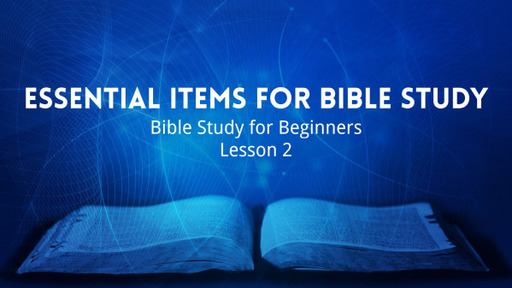Essential Items for Bible Study

Notes
Transcript
Handout
To do any job well you need the proper tools.
If the Bible was all you had, that would be enough.
But, by God’s grace, we live not only in a time where we have lots of tools but we they can be easy to use.
1. Me
1. Me
A. My mind.
A. My mind.
We too often think we need someone to explain the Bible to us.
We disengage and don’t even try.
For those who have been studying the Bible, we can forget to use our brain.
In some ways Bible study should get easier.
The more you study, the more you know.
The more you know the less you have to learn.
God gave us a mind to think with.
Use it.
Don’t just rely on what you’ve always been told about a certain passage.
Think about it later in the day.
Think about it when you hear someone else teaching something else.
B. My heart.
B. My heart.
There should be an emotional response to what you study.
You should feel joy, conviction, sadness, anger, wonder - many emotions.
Engage with what the writer is saying.
Get rid of distractions and have a heart ready to listen and obey.
C. My Spirit.
C. My Spirit.
Better said - The Holy Spirit
Now we have received not the spirit of the world, but the Spirit who is from God, that we might understand the things freely given us by God.
And we impart this in words not taught by human wisdom but taught by the Spirit, interpreting spiritual truths to those who are spiritual.
The natural person does not accept the things of the Spirit of God, for they are folly to him, and he is not able to understand them because they are spiritually discerned.
The spiritual person judges all things, but is himself to be judged by no one.
2. A Bible.
2. A Bible.
Of course this is obvious, but what isn’t so obvious is what Bible.
It is helpful to have multiple translations.
A study Bible can be good but has some pitfalls. (I don’t recommend)
You don’t need to buy a bunch of Bibles…
There are great apps and programs.
We will cover this some later and even more in weeks to come.
Let’s talk about translations for a minute…
You have this on the back page of your notes.
3. A notebook.
3. A notebook.
A notebook to write things down as you study.
Again - your own system.
If you have a question, write it down.
Scribble whatever you want just make sure you are writing.
Write, don’t type on your first round of study.
Handwriting forces us to focus on what we are writing.
4. Various writing utensils.
4. Various writing utensils.
Find a system that works for you!
Get some highlighters, pens, colored pencils.
Mark up your Bible.
Mark up your notes.
Most electronic Bibles have build in marking utensils.
6. A concordance.
6. A concordance.
A Bible concordance contains an alphabetical index of words used in the Bible and the main references.
It is useful to help us locate other passages.
If you can remember just one word in the verse then you can find it with a little work.
Google works great for this.
A good one will help you see how translators translated a greek word in other places of the Bible.
I do this often.
You will often find a small concordance in the back of your Bible but stand alone concordances are much better.
Recommended concordances:
Young’s Analytical Concordance
Strong’s Exhaustive Concordance
If a concordance contains ALL the words in the Bible it is considered an exhaustive concordance.
A concordance that matches the version of your Bible is helpful.
Here’s what those look like.
Also… biblestudytools.com has it free for KJV and NASB. (this is a really easy option for now. In later weeks I’ll show you a couple of other options)
Create an account.
Its free you don’t need the Plus option.
Choose your passage.
Click the setting button.
This is what you get.
Turn on Strongs numbers.
Here they are.
Then you get all your info
Meaning
Where its used
6. A Bible dictionary.
6. A Bible dictionary.
Bible dictionaries are one of the most practical and useful books you can have at your disposal.
They allow you to discover the original meaning and study a word in a particular passage and context.
A concordance with a dictionary allow you to dig deeper without being a Greek expert.
7. A commentary.
7. A commentary.
A commentary (as well as a study Bible) contains thoughts from a particular scholar or group of scholars on the meaning and application of a passage.
This can be helpful but there are pitfalls…
They may not be accurate.
Thy can cause us to not think for ourselves.
However they can bring a lot of clarity to a passage.
They can help you see things you didn’t see.
They can help you understand the history and culture.
bestcommentaries.com
bestcommentaries.com
Other good things… (Slide)
